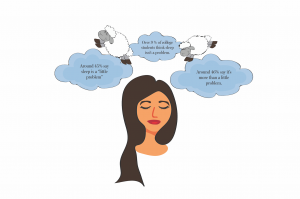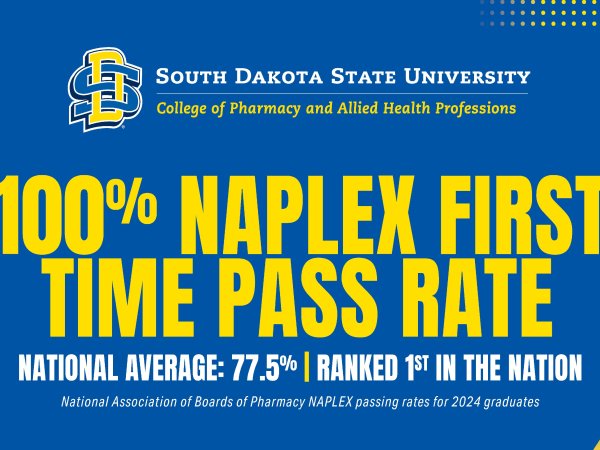Sleep deprivation can be as detrimental to student success as drinking and drug abuse, according to a study by the University of St. Thomas.
A program based on this study is coming to South Dakota State and, for what administrators say is the first time, it’s bringing campus-wide awareness to sleep.
“Center for College Sleep” will be on campus Nov. 16 and 17 and a keynote presentation is open to students at 7 p.m. the first night in the Volstorff Ballroom called, “Sleep: the Secret to Success in College.”
Launched in January 2016, the college has visited 50 campuses. The project is tailored to each campus and takes a closer look at sleeping habits of students and how the campus environment may affect sleeping habits.
A survey sent to students Oct. 31 is one of two parts of the project assembled by the “SDSU Health Team” consisting of dean and administration leadership. The second aspect of the project is the “College Sleep Environmental Scan.”
According to Roxanne Prichard, the scientific director of the project, it has reached more than 70 college campuses across the nation. Prichard believes what sets it apart from others is being specific to college students.
“We’re going to look for what are the most common impediments to sleep at South Dakota State,” Prichard said. “Is it more of a caffeine issue, is it more of a stress issue, is it more of a time management issue, is it more of a difference in schedules?”
SDSU administrative officials said this is an aspect of students’ daily lives generally not discussed.
“Almost from middle school forward, there’s some strong messaging on substance abuse prevention and stress management,” said Doug Wermedal, associate vice president of student affairs, “but there’s almost nothing out there on sleep health, which, if it’s as important, it’s clearly an area to be developed.”
With programs such as DARE and Fighting Addiction Through Education (FATE), the negative effects of drug and alcohol abuse are heard over and over, but sleep is hardly mentioned.
According to a 2010 national survey by American College Health Association, sleep was a top concern.
Jessica McLaughlin, a counselor at the Wellness Center, said sleep isn’t usually the initial reason students come to see her, but is often the underlying factor.
“A student who can’t focus or remember things, they’re working twice as hard to study for something than they would need to if they could get more sleep,” McLaughlin said. “Take the time to sleep, because it’ll help you actually be more of an efficient student.”
McLaughlin said students often go to the clinic due to side effects of drinking too much caffeine and trying to stay awake.
Hunter Klontz, a senior agricultural education major, said she feels the effects of lack of sleep on a weekly basis as she gets, on average, around six hours of sleep a night keeping up with homework and student teaching.
“I can definitely tell in the mornings when my eyes are bloodshot and you feel exhausted, so every single day it happens,” Klontz said.
A 2016 survey by ACHA found more than 9 percent of college students think sleep isn’t a problem. Around 45 percent say sleep is a “little problem” and the other 46 percent say it’s more than a little problem.
It tends to be a given that lack of sleep will become prevalent to a student’s life in college and Wermedal thinks it may be due to the stress of success in students.
Pressure from higher education and society can “emphasize achievement so much there’s sort of a default endorsement in doing whatever it takes,” Wermedal said. Abusive sleep patterns can develop from the added stress and instead of getting the recommended amount of sleep, students are getting only three to five hours.

Finding time to relax can be difficult with the distractions on and off a college campus that ward off sleep, but could be instrumental to maintaining proper health.
“It’s just not something that you realize is probably the actual culprit of your issues. You just think: I’m stressed, I have anxiety, I’m sick, I have this,” said Mariah Weber, a wellness coordinator at the Wellness Center, “and then sleep is affected, but it’s usually the other way around.”
McLaughlin and Weber shared tips on how to get the sleep that evades restless students and said routine is key to maintaining a proper sleep schedule.
“We perform the best with routine and structure. It makes a lot of our unpredictable life predictable for us,” McLaughlin said.
Calming down and relaxing at night by only using the bed as a place of rest and not to watch Netflix or eat makes falling asleep easier. Staying away from social media before bed is advised as well.
“In general, they’re not healthy ways to end your day,” Weber said.
More tips will be discussed at the Nov. 16 presentation. In the meantime, the survey can be completed to participate in the research for the University of St. Thomas’ presentation on their findings.



















